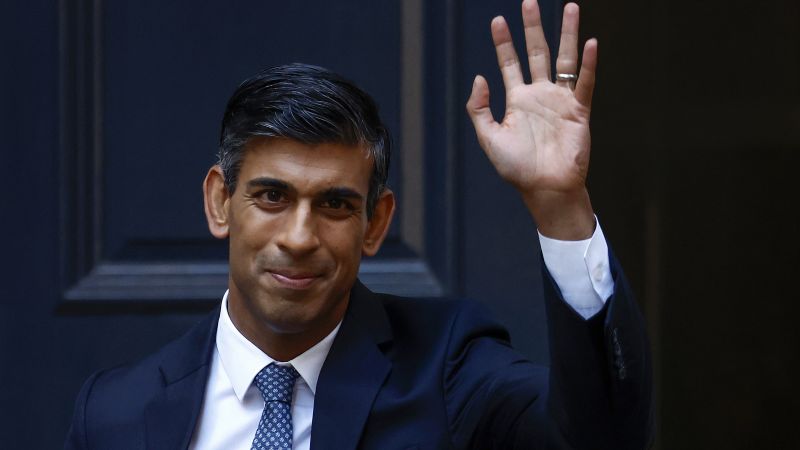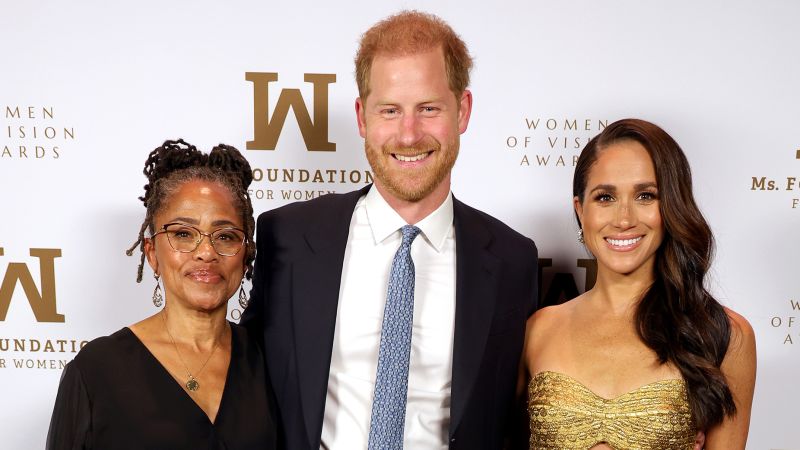Opinion: What Britain’s first Asian prime minister means to my family

Editor’s Note: Sunder Katwala is the director of British Future, an independent, non-partisan think tank. He was previously general secretary of the Fabian Society think tank and leader writer and online editor at the Observer newspaper. Sunder was born in Doncaster, Yorkshire, to parents who came to Britain from India and Ireland to work for the NHS. The views expressed in this commentary are his own. Read more opinion on CNN.
CNN
—
Rishi Sunak becoming Prime Minister is an important moment of social history in Britain, yet it is a curiously understated one in some ways.
In his first speech from 10 Downing Street, the new Prime Minister said he would get to work fixing the economic mistakes of his predecessor Liz Truss and restoring trust in politics. He made no reference to being the first British Asian Prime Minister, or the first post-war ethnic minority Prime Minister.

There is, among the broader public and especially the white British population, a wariness about making too much of the ethnicity or faith of the Prime Minister if we want fair chances for all. Yet it would be remiss not to recognise such a powerful symbol of shifting attitudes to Britain’s diversity.
Next year, the coronation of King Charles III coincides with the 75th anniversary of the arrival of the Windrush in 1948, the boat which has come to symbolise an ‘origins moment’ for post-war Commonwealth migration to Britain and the rise of our modern, multi-ethnic and multi-faith society.
Sunak’s presence as Prime Minister will tell an important story of how Britain has changed over three generations. Yet each of those different generations may have a different perspective on the significance of his premiership. That is what I have found reflected in my own family.
My father thinks it is an enormous marker of social progress in Britain in his lifetime. Dad came to England from India in 1968. After completing his medical training, he arrived in England to look for work as a doctor in the National Health Service. This was just a week after Enoch Powell made the infamous ‘Rivers of Blood’ speech, which was to resonate down the decades.
Powell wanted to persuade my Dad – and the hundreds of thousands of Indian and Commonwealth migrants who had come to Britain – that they needed to go back home.
Powell’s central fear was that the birth in Britain of their children – people like me, or Sunak – would make a multi-ethnic Britain inevitable. For Powell, that was the death of his idea of the nation.
For my father, Sunak as Prime Minister matters – because it is the final proof of how wrong Powell was.
Sunak, born in 1980 is, like me, part of the first British-born generation of ethnic minority Britons. If the generation before us who had migrated to Britain had sometimes talked about ‘keeping a suitcase packed just in case,’ we knew that we had a birthright claim to be British.
And many of us did benefit from wider opportunities in Britain, as our parents had hoped we would.
Like Sunak, I was born into a country where there were still no Black or Asian MPs at all. When I left university in the mid-1990s, there had still never been a single Black or Asian Cabinet minister.
If you had asked me then, I would have said we should expect to see that change. I could easily imagine a Black British Education Secretary, an Asian Home Secretary, perhaps a Leader of the Opposition. But a Prime Minister? I would hope so – but that felt a very long way off.
It is only in the last five years, after several ethnic minority Chancellors and Home Secretaries, that it became clear that having a British Asian Prime Minister was surely only a matter of time.
It surprises many people to hear that no British Asian served in the Cabinet until 2010, when David Cameron made Sayeeda Warsi his party chair from the (unelected) House of Lords. The first British Asian elected MP to serve in Cabinet was Sajid Javid as late as 2014, so any bid for the party leadership was hardly conceivable before that.
Yet my teenage children see this entirely differently. They were surprised to hear last week that there had never yet been a British Asian Prime Minister. They wondered what had taken us so long, when Barack Obama had been the first American President of their lifetime.
Young adults from Asian and Black British backgrounds, born in this century, are also less likely to see Sunak’s premiership as cause for celebration. Their question is why the promise of equal opportunities has yet to be met in full.
That is why most young people – Black, White and Asian – supported the anti-racism protests of 2020. They can be irritated to hear celebratory accounts which suggest they might be grateful to not face the levels of racist violence and overt discrimination that their grandparents faced.
Many will want to know what Sunak will do for those who did not have the educational privileges he had.
My Dad and I are right to say that Britain has come a long way. But I see the skepticism of the next generation about that as a positive indicator of integration.
Perhaps the most important part of our progress was to see expectations rise even faster. Our new Prime Minister has benefited from our past progress. I hope he can answer the next generation’s challenge about what more needs to change for us to continue our unfinished journey towards equal opportunities.






